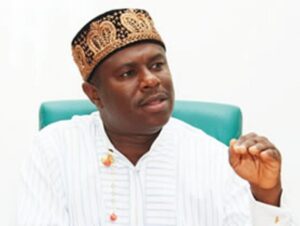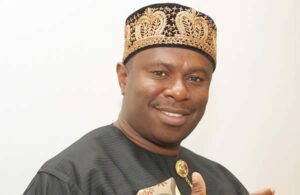
Naira: Comedy inside a tragedy
By Dakuku Peterside
On Sunday, August 15, 1971, the United States economy was literally facing a firing squad. The Dollar was in a mess. Price gougers were everywhere and foreign exchange was cruel to the Dollar.
The newspaper headlines were of scorn and ridicule but President Richard Nixon did one thing. He faced the issue squarely. “The strength of a nation’s currency is based on the strength of that nation’s economy,” he said. Nixon nipped the problem in the bud. Everything changed. He rescued his country from financial and social crises. Today, Nigeria is in a similar situation, albeit slightly dissimilar, given that the American economy is by far the strongest in the world. Thus, President Bola Tinubu needs to act in a manner that moves the nation from “Renewed Hope” to “Renewed Confidence.”
The loss of hope was what triggered the Arab Spring and other springs. In December 2010 in the town of Sidi Bouzid, Tunisia, Tarek El-Tayeb Bouazizi, a street vendor who had lost hope in the economy of his country set himself on fire. That act became a catalyst for countrywide protests. The protests included several men who emulated Bouazizi’s act of self-sacrifice. Hope is good. However, hope is not edible.
In Nigeria, there are reported and unreported suicide cases due to economic hardship in the country. A few weeks back, a woman who works at a Bank locked herself in the convenience of her company and swallowed poison, leaving behind a suicide note which points at her giving up on Nigeria.
With the free fall in the value of our currency, we are beginning to see more public expression of frustration. In the coming months, the unrelenting fall of the Naira could lead to an increased risk of suicide and even social unrest. In Kano State, where social unrest forms quickly, a group of local bakers warned the government about things to come. They protested the high cost of flour with a bag that sold N10,000 a few years ago now selling at N41,000. The Kano bakers cannot afford the price spiral and social unrest arising therefrom could pose additional risks to economic recovery and create setbacks with lasting impact on general economic performance.
For a government looking for an economic spark plug through Foreign Direct Investment (FDI)and business startups, the fall of the Naira and global jokes about it are downright depressing. The fall of Naira indeed poses grave dangers to the viability of businesses in Nigeria.
Last August, Iyinoluwa Aboyeji, a young Nigerian celebrated all over the world for creating two unicorns and a general partner at early-stage venture capital firm, Future Africa, told Rest of World, an America-based publication, that his firm is advising its portfolio companies to explore business abroad to avoid Naira-related challenges. “Generally speaking, we want to move as many of our companies as possible to start to export software and labour because we think that’s the only way to stay on the better side of this crisis — when revenues are in US dollars,” he said.
Over the past two weeks, social media have been awash with hilarious jokes about the Naira. This is not restricted to Nigerians. First, a Toronto-based Television station announced that Nigeria’s currency was now worth 0.0011 American Dollars. This was followed closely by a South African Prokerala showing that one Zimbabwean Dollar equals 2.77 Naira. In its 2nd February 2024 edition, Bloomberg described the Naira as the worst-performing currency in the world. In their cartoon section, two US newspapers taunted Nigeria over the Naira. This is infinitesimal compared to the number of local jokes about the Naira in our media. Besides, social media has amplified the crash of the Naira to such an extent that Nigeria has literarily and metaphorically become a laughing stock. Nigerians are either losing faith in the country or have lost a sense of patriotism.
These hilarious jokes and caricatures are a metaphor for a bigger problem. There are genuine concerns that Nigeria may follow a similar trajectory to Zimbabwe and Venezuela. This concern is well-founded. The echoes of Zimbabwe ring eerily and loudly in Nigeria today. There are many reasons why history students could look back on the crash of the Naira and its impact on our reputation, global stature and the living standard of our people. This concern is heightened for many reasons. However, I will highlight only a few.
The first is poor policy articulation and implementation. Recall that the policy origin of the current Naira tumble can be traced to the simultaneous removal of subsidies and years’ long currency pegs last year by the current administration. This was done without considering other factors that need to be in place to make the economy function optimally. Nigerians are worried that our economy handlers are not doing enough to stem the decline.
The second is the damaged reputation of the country occasioned by the Naira crash and the ongoing economic and security instability. Local and foreign investors are losing confidence in the Nigerian economy because of high-level financial, economic and policy instability.
The next is that the cost-of-living crisis escalates and inflation ravages the country. Prices of essential goods and services are going off the roof and people are perplexed at the rate of degeneration.
The fourth is that microeconomic indices are unfavourable given the reduction in demand for goods and services due to high prices and reduced supply. The latter itself is due to lack of production or high cost of importation.
Also, there are unfavourable macroeconomic indices such as escalation of unemployment. This correlates with a high crime rate, high inflation occasioned by a fall in the value of the Naira, banks’ inability to grant medium to long-term loans and general perception of impending economic catastrophe hovering over Nigeria like an ominous overcast.
The fifth is that wealthy Nigerians and other average citizens worried about the erosion of the value of their money and assets are converting them into Dollars or are moving their assets to dollar-denominated investments abroad to hedge for further loss.
Finally, the volatility of the Naira implies that fresh capital investments in infrastructure and power, mainly dependent on imported plants and machinery, shall be negatively impacted, leading to projects being put on hold. How did we tumble in such a short time from a respectable nation to a butt of jokes? Not only amongst us but within the global community?
A brief historical odyssey on Naira volatility suffices. The tragic history dates back to 1983 when the Naira began her nosedive and successive governments have failed to ameliorate the plunge. In 1983, $1 was exchanged for about 72 Kobo. But the Naira fell to trade at about N9 to $1 by 1990. In 2000, $1 was exchanged for about N85 at the official window. In 2010, $1 was officially exchanged for about N150, but more at the notorious black market. By 2020, $1 was exchanged for about N360 at the official window. In recent years, the Naira has faced challenges related to external factors. These include fluctuations in oil prices, the global economic impact of the COVID-19 pandemic and serial mismanagement.
A cursory look at this Administration’s response to the Naira crisis shows an attitude of calm amidst the panic at the early stages of the free-floating of the Naira, as policymakers expected the fall in Naira. However, there were more panic reactions to this problem as the President and his economic team worked to stem the tidal wave blowing the Naira. Recently, we have seen monetary policy adjustments and currency interventions to boost the Naira. They have implemented fiscal policies to promote economic growth and stability while adjusting tax policies to encourage investment and economic activity. Structural reforms by taking steps to diversify the economy to reduce dependency on a single sector and improving the business environment to attract foreign investment is ongoing. Unfortunately, these policies and actions have not stabilized the Naira in the short run. More needs to be done and quickly too. There is no one-size-fits-all solution, and a combination of strategies may be necessary.
Additionally, the success of these measures depends on practical implementation and the cooperation of various stakeholders. Investor confidence remains our greatest challenge. It is advisable for this Administration to carefully analyse the specific economic conditions and consult with experts to tailor appropriate solutions for the country. Every good head, home and abroad must be brought into the room to stop us from remaining a butt of jokes. Saving the Naira is most important now and all stakeholders must work together to end this comedy show.


